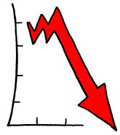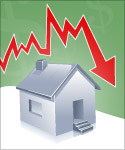
A lot has gone right for the banks lately. Changes to accounting rules have allowed them enough breathing room to operate. Mortgage loan modifications have brought in fees. And trading activities have even helped some banks to boost profits.
Still, I believe there's another banking shoe to drop.
Foreclosure sales are the majority of home sales these days. And when a bank sells a foreclosed home, it is a realized loss. That's as opposed to a non-performing loan or a foreclosed home that has yet to be sold, which can be counted as an asset.
Further exacerbating this is that banks are not realizing as much profit on the sales of foreclosed homes as they're all flooding the market with them and thus driving down prices.
So I expect to see higher losses affecting banks' earnings in the future. These losses may not show up in the earnings season that's about to begin, but they are looming.
It was reported today that mortgage applications fell 19% last week, another sign that foreclosures are driving the market. It also reinforces the point that once foreclosure sales slow, there may well be little demand for traditional home sales to pick up the slack.
Rising interest rates and still-falling home values are also impacting new mortgage applications. It's a buyers market, and there's no reason to rush in when prices are falling and loan costs are rising.
Bloomberg is reporting that 20 million (21.5%) of the 93 million homes, condos and co-ops in the U.S. are underwater as of March 31, 2009. Somebody will take these losses at some point, whether it's the homeowner, the bank or the government/taxpayer or a combination of any or all of the three.
We know that sub-prime mortgages were a major source of non-performing loans and foreclosures. Now, prime mortgages are in trouble. In his morning missive to his traders, TradeMaster Daily Stock Alerts' Jason Cimpl had this to say:
"Delinquencies on prime mortgages soared in the first quarter of this year. Delinquency rates on prime mortgages, the least risky category, were 661,914, a jump from 250,986 a year earlier. Two thirds of all mortgages in the U.S. are prime mortgages, so any percentage increase in delinquencies represents a huge absolute number of delinquent mortgages. Here is more proof that banks are in for a tough few years as they must monitor their loan portfolios even closer and suffer write-offs. If prime mortgages start going south in a big way, look for banks to stiffen lending standards even more. Either way, this will have a negative impact on their bottom line numbers."
The evidence is building that the economy is nowhere near out of the woods. And we can also see that banks will be facing serious problems ahead. Investors should be on their toes.



